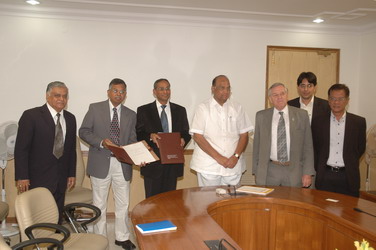
Monsanto and India's TNAU to Develop PRSV-resistant Papaya
October 26, 2007| |
In response to a request from Tamil Nadu Agricultural University (TNAU) in India, Monsanto Company, USA, announced a royalty-free transfer of its Papaya Ring Spot Virus (PRSV) resistance technology to TNAU. The agreement was facilitated by the International Service for the Acquisition of Agri-Biotech Applications (ISAAA). This agreement, sealed in the presence of Shri Sharad Pawar, Honorable Union Minister for Agriculture (MOA) and Dr. Clive James, Chairman and Founder, ISAAA, was signed by Dr. C. Ramasamy, Vice Chancellor, TNAU, and Sekhar Natarajan, Chairman, Monsanto India.
PRSV can cause losses up to 30 to 70 per cent and eventually lead to total failure of the crop. The technology transfer could result in the development of improved papaya varieties of better quality and good flavor with increased virus resistance that offers a potential 75 lakh quintals (or 750 million kg) potential yield increase to India’s papaya industry.
In India, papaya is cultivated mainly in the states of Maharashtra (largest producer in India), Uttar Pradesh, Bihar, Assam, Andhra Pradesh, Tamil Nadu, Karnataka, Gujarat, West Bengal, Orissa, Manipur and Meghalaya. Papaya is mostly grown by small and resource poor farmers. According to the National Horticulture Board (NHB), India produces 250 lakh quintals (2,500 million kg) of papaya annually. Since the mid-90s, pests have become a major threat to the production of commercial papaya in India, particularly PRSV.
Monsanto’s PRSV resistance technology can confer complete resistance to the virus. This has not been possible thus far via conventional technology. The technology has already been commercialized in the US and China, and is being used to develop biotech crops by several other nations around the world.

From left to right, Dr CD Mayee (Chairman, ASRB), Dr P. Balasubramanian (Director, TNAU), Mr Sekhar Natarajan (Chairman, Monsanto India), Mr Sharad Pawar (Union Minister of Agriculture), Dr Clive James (Chairman, ISAAA), Mr Bhagirath Choudhary and Dr Randy Hautea (ISAAA).
For more information, email Bhagirath Choudhary of the ISAAA South Asia Office at b.choudhary@isaaa.org.
| |
Biotech Updates is a weekly newsletter of ISAAA, a not-for-profit organization. It is distributed for free to over 22,000 subscribers worldwide to inform them about the key developments in biosciences, especially in biotechnology. Your support will help us in our mission to feed the world with knowledge. You can help by donating as little as $10.
-
See more articles:
-
News from Around the World
- New WB Report Discusses Importance of Agriculture for Development
- Poverty in Developing World is Declining
- How Will Science and Technology Feed the World in 2025?
- Cassava Breeders Unite to Derail CBSD Spread
- West Africa to Benefit Much from Bt Crops, Study Says
- Africa's Fight Against Hunger Making Slow Progress
- Syngenta Licenses Chromatin’s Gene Stacking Technology
- OSU Recommends Bt Maize to Stop Spread of Corn Rootworm and Variant
- USDA Releases New Pecan Variety
- Bt Cotton's Positive Impact in North India
- Monsanto Allowed to Extend Bollgard Planting in Australia
- Monsanto and India's TNAU to Develop PRSV-resistant Papaya
- Syngenta and QUT Start Research on Producing Ethanol from Biomass
- French Think GMO Cultivation Will Help Farmers
- EU Approves Herculex RW Corn
-
Research Highlights
- Identification of a Phytotoxic Amino Acid from Fescue Grasses
- RNAi useful in Wheat Functional Gene Analysis
- GM Mulberry with Increased Salinity and Water Stress Tolerance
- Tobacco with Reduced Nornicotine by Targeted Mutation
-
Announcements
- Agri-Biotech and Biosafety Conference in Central Asia
- Vavilov-Frankel Fellowships for 2008
- International Symposium on In Vitro Culture and Hort Breeding
- Repeat Announcement: BioMalaysia 2007 – Innovation for Quality of Life
-
Read the latest: - Biotech Updates (December 3, 2025)
- Gene Editing Supplement (November 26, 2025)
- Gene Drive Supplement (February 22, 2023)
-
Subscribe to BU: - Share
- Tweet
